Difference between revisions of "Excalibur"
(New page: Created by: Kenneth Clark thumb|400 In the first half of the 5th century, Roman forces were progressively withdrawn from the province of Britannia. A last appeal ...) |
|||
| Line 1: | Line 1: | ||
Created by: Kenneth Clark | Created by: Kenneth Clark | ||
| − | [[Image:Excalibur.gif|thumb| | + | [[Image:Excalibur.gif|thumb|400px]] |
In the first half of the 5th century, Roman forces were progressively withdrawn from the province of Britannia. A last appeal from the now unwarlike Britons for Roman troops to return and defend them from the hordes poised across the sea went unanswered; Britain was alone and the Dark Ages began. By 1066 the Saxons and their kin were kings. Somewhere in the region of AD 500 archaeological evidence suggests that the tide of Saxon incursion was stemmed and even thrown back for some 20 years. Excavations at Cadbury Castle reveal that at this time it was occupied by a wealthy Romano-British chief of some importance. Was this Camelot? | In the first half of the 5th century, Roman forces were progressively withdrawn from the province of Britannia. A last appeal from the now unwarlike Britons for Roman troops to return and defend them from the hordes poised across the sea went unanswered; Britain was alone and the Dark Ages began. By 1066 the Saxons and their kin were kings. Somewhere in the region of AD 500 archaeological evidence suggests that the tide of Saxon incursion was stemmed and even thrown back for some 20 years. Excavations at Cadbury Castle reveal that at this time it was occupied by a wealthy Romano-British chief of some importance. Was this Camelot? | ||
Latest revision as of 16:06, 7 January 2008
Created by: Kenneth Clark
In the first half of the 5th century, Roman forces were progressively withdrawn from the province of Britannia. A last appeal from the now unwarlike Britons for Roman troops to return and defend them from the hordes poised across the sea went unanswered; Britain was alone and the Dark Ages began. By 1066 the Saxons and their kin were kings. Somewhere in the region of AD 500 archaeological evidence suggests that the tide of Saxon incursion was stemmed and even thrown back for some 20 years. Excavations at Cadbury Castle reveal that at this time it was occupied by a wealthy Romano-British chief of some importance. Was this Camelot?
0.The usual 1971 regular Diplomacy rules apply save where altered below.
1.The initial placement is as follows:
BRITISH: A(Deva); A(Caerwent); A(Glenvum); A(Londinium) PICTS: A(Mearns); A(Fife); A(Edwinsburgh) SCOTS: A(Dublin); F(Ulster); F(NORTH CHANNEL)
SAXONS, ANGLES, JUTES & FRISIANS: Each have two fleets and one army all off-board. These four players are referred to collectively as the Germanic Tribes.
2.The Germanic Tribes may deploy one fleet each before the games starts in the following areas: Dogger, German Sea, Wash, Frisian Sea, Thames, East Channel, Middle Channel and West Channel. First the Saxons and the Angels each place one fleet and all four Germanic players are informed of the result. Then the Jutes and Frisians each place one fleet and all players are informed of the fleet positions and the game begins. If two fleets try and deploy in the same area then neither succeeds and they both start the game off-board.
3.Germanic off-board units may enter the map only be the five easternmost sea spaces (Dogger down to East Channel). Scots off-board units may enter the board via Ulster, Dublin or Wexford (if an army) or Hebrides, Ulster, Wexford or Atlantic (if a fleet). Off-board units may be supported on to the board, but may not give support from off-board. No unit may retreat off-board.
4.Fleets may sail around the northern tip of Caledonia by entering the "Orkney" box which is connected to Mearns, Dogger, Highlands or Hebrides. Any number of fleets can occupy Orkney and no fleet may ever be excluded from it. Units cannot be dislodged from Orkney, nor may they give support from, or convoy through, or retreat to Orkney. A fleet may be supported from Orkney on to the board.
5.The Scots start the game with ONE off-board s.c. which is removed following the adjustments after the second game-year. However, during the first two game-years the Scots may not go below three units.
The Germanic Tribes start the game with THREE off-board s.c.'s each, although each Tribe loses one of the s.c.'s following the adjustments after the first, second and third game-years. However, during the first three game-years each Germanic Tribe may not go below three units.
6.Scots and Germans may build in any s.c.'s they own. Germans must give preference to building in their off-board centres if they remain.
If after any Autumn season the British player has less than three home s.c.'s he may nominate any other s.c. in his possession as a home s.c. In postal play conditional orders should be used. Once a British home s.c. has been controlled by any other player it can never again be used by the British as a home s.c. for building purposes, even if it is recaptured. Such a s.c. will continue to be able to support a unit and can be build in by Scots or Germans.
7.A unit may not disband unless no legal retreats are possible. Units that do not receive a valid retreat order will be retreated by the GM in order of priority to (a) home s.c.'s (b) other s.c.'s (c) space nearest to a home s.c. (d) space nearest to any other s.c. (e) alphabetically. If two units try to retreat to the same space neither succeeds and they must try to retreat elsewhere.
8.The winner is the first player to control 18 s.c.'s. Play begins in spring AD 450.
